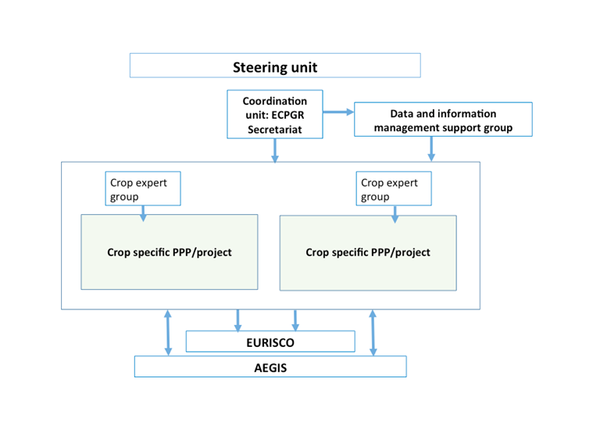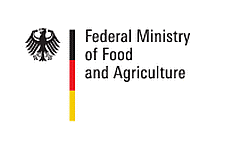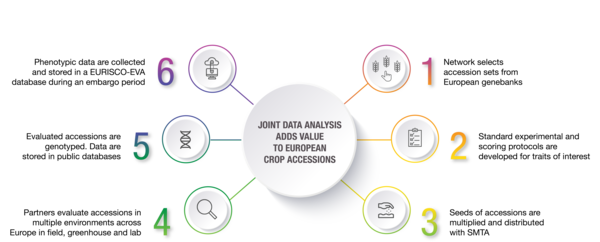Organization of the EVA networks
EVA is centrally coordinated by the ECPGR Secretariat, providing administrative and project management support. A Steering unit composed of experts from the public and private sector and ECPGR provides strategic guidance to the project. A data and information management support group, centered around the EURISCO offices is responsible for ensuring evaluation data are standardized, made available to project partners during an embargo period and included in the public domain after the end of the embargo period.
Providers of genetic material as well as evaluators from the public and private sector can become Members of EVA and form Crop-Specific Networks where they work together to generate relevant evaluation data on selections of genetic resources available in European genebanks. Crop expert groups are created as necessary with representatives from partners in the networks to provide specific guidance and expertise on aspects of the evaluation (e.g. development of standard protocols, genotyping and data analysis).
Organigram of the European Evaluation Networks (EVA):

The EVA Process
General principles of the project include the joint selection of traits and accessions by the project partners. According to the work planning of crop-specific networks, different sets of genebank accessions are made available by the genebanks under the FAO-ITPGRFA Standard Material Transfer Agreement and multiplied by project partners in order to generate material for the following evaluations. Evaluations of agronomic, biotic and abiotic stress traits are done mostly as in-kind contributions by project partners in laboratory and field trials in multiple locations across the continent using standard experimental protocols and ontologies in order to generate comparable data. All evaluated accessions are also genotyped. All data will be collected in the EURISCO database and made openly available after an initial embargo period during which project partners have access to data through a dedicated EURISCO-EVA intranet, to incentivize the collaboration of private breeders.
How the EVA crop networks operate
The graphic below shows the general approach undertaken by EVA crop networks to jointly evaluate sets of genebank accessions. Work plans may be adjusted to reflect crop-specific agronomic practices or needs of breeders. Wherever possible, networks should exploit existing data and resources, making them available to breeders and researchers.
EURISCO-EVA database
A project-specific database was developed by IPK Gatersleben for the management of the collected phenotypic trial data along with relevant metadata. The EURISCO-EVA database uses the same backend as the public EURISCO database, thus enabling synchronization and upload of project data to the public domain after the embargo period.
The database has incorporated a number of useful features, including a verification tool checking for correct formatting during data upload, filtering and pivot functionalities and display options for visualization of phenotypic data. Partners can access the database through their institute credentials and download full or filtered datasets for further analysis.
Genotyping data are deposited in suitable public databases and made available to the interested public according to FAIR principles. Integration of DivBrowse, a SNP-viewer developed by IPK, will allow EVA networks to also visualize genotyping data through the EURISCO-EVA database.
Exchange of genetic material
The PGRFA evaluated in the EVA networks are publicly available at the respective holding institutes and exchanged between evaluation partners throughout the project in compliance with the terms outlined in the Standard Material Transfer Agreement of the Multilateral System of the International Treaty for PGRFA.
EVA in the long term
EVA is envisioned as a self-sustaining long-term project, executed through in-kind contributions of evaluation partners and supported financially through additional project grants for coordination and certain activities such as genotyping. Initial funding by the German government through grant agreement GenR 2019-2 (and amendment) for the period 2019-2024 is intended to kick-start activities. EVA networks will continue thereafter on a rolling circle basis with continuous cycles of selection of accessions from genebanks, multiplication of material, evaluations and data analysis, funded through sources identified by the networks. In this way, novel sources for advantageous traits will be identified in the often large but under-characterized inventories of genebanks.
Within the Horizon2020 project AGENT (Activated GEnebank NeTwork) the EVA Wheat and Barley network is provided with funding for a third cycle of evaluations in 2022-2024.
The Horizon infrastructure project PRO-GRACE, running from 2023 to 2025, aims at conceptualizing a European research infrastructure for plant genetic resources (PGR). It includes activities promoting the EVA networks, such as the development of standard protocols for documentation and evaluation, identification of services on PGR that could benefit EVA networks and stakeholder mapping to identify new users.
In 2023 the ECPGR Grain Legumes Working Group started a project under the ECPGR Grant Scheme, aimed at establishing an EVA Legumes network. Read more about the forEVA project.
The three-year SusCrop-Era-Net project MineLandDiv (Mining allelic diversity of maize landraces for tolerance to abiotic and biotic stresses), coordinated by INRAE, started in March 2023 and involves several EVA Maize partners, exploiting also EVA results and providing a possibility to extend the EVA Maize project and involved stakeholders. The project proposes to mobilize European maize landraces for use in further breeding, combining different up-to-date genomic approaches, genetic and statistical methods with high throughput phenotyping, with the goal of identifying interesting landraces and favourable alleles for biotic and abiotic stresses, thereby increasing the genetic diversity of breeding genepools and contributing to increased resilience of European agriculture.

and Agriculture for the period 2019-2024.


